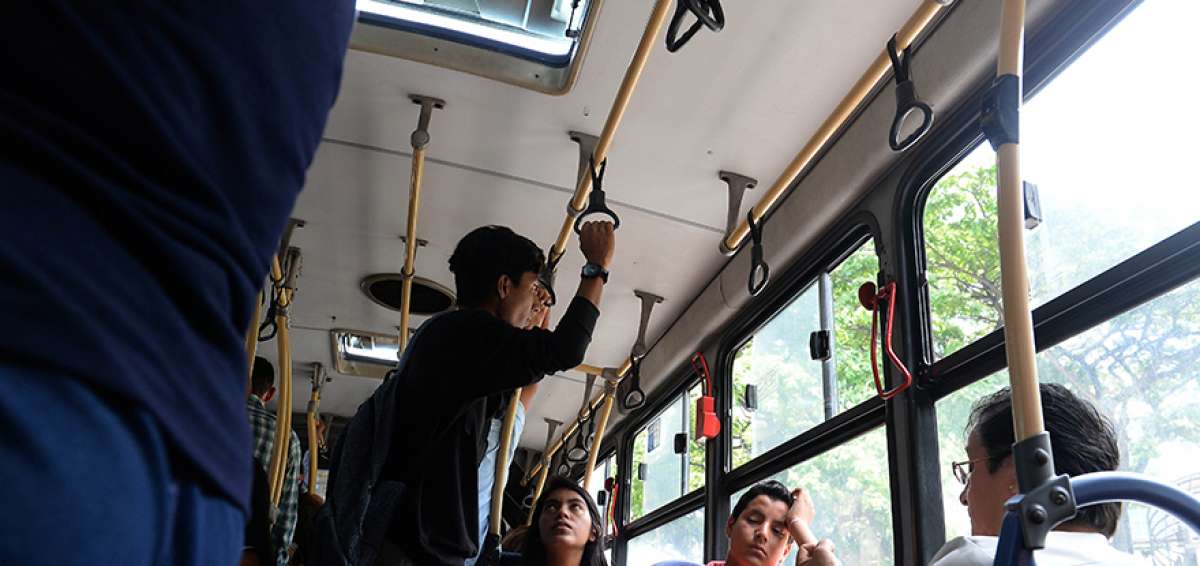The Fight against Sexual Harassment runs Smoothly in Ecuador

In 2014, 81% of women users of urban public transportation in Quito reported having been victims of violence. Out of this, 91% of the incidents took place in public spaces in Quito. The fight against sexual harassment runs smoothly in Ecuador, where the campaign Bájale al acoso (Stop Harassment) was conducted in more than 2,200 buses, where more than a thousand complaints were reported, out of which, 11 turned into actual convictions.
The strategy began in March 2017 in 120 units of the public transportation system, but has reached 80% of the private sector as well, now the alert program is operational on almost all routes in the Metropolitan District of Quito. The procedure has gotten simpler in order to serve a person that has recently been victim of harassment: they only need to send a text message to 6367 with the word ACOSO (HARASSMENT) and the bus number (these SMS are free of charge). The SMS is sent to a head unit that immediately communicates with the driver of the vehicle and the following message is transmitted through the loudspeakers: “There has been a situation of sexual harassment in this transport unit. We ask all passengers to remain alert and to respect those who are around you”.
Less than a minute later, the victim receives a call from psychologists in a head unit which previously located the bus, and is offered support over the telephone while the Metropolitan Police and the teams of the transportation company teams are ready to intervene in the next stop. The authorities listen to the victim's recount to define the next steps: get off the unit in the next stop and make the report at that time or, if desired, do it later with the support of the team. The psychologist Michele Vilatuña, who works in the program, says that the most serious cases she has treated include “users who masturbate or ejaculate in the victims”, some of them minors, teens or young people up to the age of 27.
According to the expert, between 10 and 15 cases are reported daily, between two and four of those “are directly related to situations of sexual abuse and harassment in public transport.” Since its implementation, the system has received 1,234 complaints, of which 31 have been channeled through the Prosecutor's Office, and 11 convictions have been processed with imprisonment ranging from 12 to 38 months. María Fernanda Pacheco, president of Municipal Board San José (Patronato Municipal San José), manager of the strategy, explains that the last two cases were “quite worrying because the victims were two girls under 12.” She stressed that the complaint process ensures, with a “very strict confidentiality policy”, that “there is no revictimization of women and girls affected.” The victims also start a healing process in which a brigade of the institutions supports them in both the reporting process and provides further assistance.
This is because they have found that they develop traumas and many have expressed fear of going out alone at night: one of them even considered not finishing night school “out of fear of being harassed”, Pacheco stated.
“We’ve managed to get the vast majority of them to go back to their daily routines, but the uneasiness persists. Even when we ask them to talk about their case, respecting their identity, of course, they don’t want to bring it up again,” she says of what ends up being a really long healing process. The program (Bájale al acoso (Stop Harassment)) emerged after alarming figures in 2014 showed that 81% of women using public transport in Quito reported having been harassed, 91% of them in public spaces. Pacheco stresses that, apart from the victims, people who have witnessed harassment also use the emergency system.
“What we have achieved with this strategy is not only the prosecution process, which is important. But what mattered the most to us was changing behavior patterns.” And thus achieve a kind of “social sanction” so that situations of harassment are no longer seen as something normal and that people around those incidents take action. One example is that of the Venezuelan national Daimary Padilla, who was groped by a stranger, and other passengers confronted the offender and pulled him off the bus. Public transport in the Metropolitan District of Quito has more than one million users per day and, according to Pacheco, more than 77% of them are aware of the mechanism. The goal is to have it installed in all buses to advance the fight against harassment and in pursuit of a safe society. (I)
 Login
Login